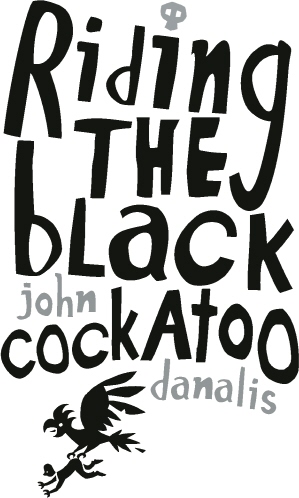Riding the Black Cockatoo





Half the royalties from the sale of this book will go to the Wamba Wamba
people, and will be used for cultural and environmental projects including the
regeneration of Black Cockatoo habitat in the hope that the clan’s totem animal
can be successfully reintroduced to Wamba Wamba Country.
First published in 2009
Copyright © John Danalis 2009
All rights reserved. No part of this book may be reproduced or transmitted in any form or by any means, electronic or mechanical, including photocopying, recording or by any information storage and retrieval system, without prior permission in writing from the publisher. The
Australian Copyright Act 1968
(the Act) allows a maximum of one chapter or ten per cent of this book, whichever is the greater, to be photocopied by any educational institution for its educational purposes provided that the educational institution (or body that administers it) has given a remuneration notice to Copyright Agency Limited (CAL) under the Act.
Allen & Unwin
83 Alexander St
Crows Nest NSW 2065
Australia
Phone: (61 2) 8425 0100
Fax: (61 2) 9906 2218
Email: [email protected]
Web:
www.allenandunwin.com
National Library of Australia
Cataloguing-in-Publication entry:
Author: Danalis, John.
Title: Riding the black cockatoo / John Danalis.
ISBN: 978 174175 377 6 (pbk.)
Subjects: Danalis, John.
Danalis family.
Wamba Wamba (Australian people).
Aboriginal Australians – New South Wales – Riverina – History.
Aboriginal Australians – Antiquities – Collection and preservation.
Restorative justice.
Human remains (Archaeology) – Repatriation – Australia.
Dewey Number: 305.8815
Cover and text design by Stella and John Danalis / Peripheral Vision
Set in 11.5/18 pt Adobe Garamond Pro by Ruth Grüner
Printed in Australia by McPherson’s Printing Group
1 3 5 7 9 10 8 6 4 2
This project has been assisted by the Australian Government through the Australia Council for the Arts, its arts funding and advisory body.

To my mother and father,
who said Yes'
To Bianca and Ebony,
our future
Acknowledgements
Many hands carried Mary back to Country; your names, tears and smiles are woven into these pages.
Writing this book has also been a part of Mary’s homecoming.
I humbly give my thanks to those who listened when I needed to speak (sometimes about the unspeakable), and encouraged me to stay at the keyboard (even when it seemed like the most inhospitable place on the continent): Judy Saunders, Boori Monty Pryor, Dr Max Quanchi, Bryan Cook, Matt Cassidy, Steve Wyborn, Peter Creagh, Alan Hamilton, Helen Belle Bnads, Dr Pee Tek Chan, Stella Danalis, Ruth Grüner, Erica Wagner, Sarah Brenan.

WELCOME TO
COUNTRY
Kurrumeruk the giant Murray cod, chased by the Yemurraki Dreamtime Rainbow Serpent, made the rivers, lakes and billabongs. Their tracks like our Ancestors are everywhere in Wamba Wamba Country. Burials form part of the tracks on our journeys to the afterlife.
Reconciliation means balancing the book of history. It is also about balancing out the injustices of our past with justice for the future so we can be at peace with our families, other people and the environment we live in. We take the good, the bad, ugly and beautiful in our histories. One ugly stain in shared history can become a glorious but profound point in our journey. Wiran, the black cockatoo with red feathers, has taken us for a flight of beauty and wonderment returning our lost Ancestor to Country.
Our Esteemed Ancestor has been returned by Warriors of a different ilk, but strong in common purpose. Strong people with strong minds know what is right and what is truth. Kindness and truth will open doors and break down barriers. Rivers of tears and a blue sky filled with
weyi
(song),
warrang-warrang
(corroboree) and joy, such is the wonder of the flight with the Wiran back to the
yemin-yemin
(burial ground) of the Wamba Wamba. Welcome to Country.
{ WYRKER MILLOO GARY MURRAY
WAMBA WAMBA NATION, MURRAY RIVER
APRIL 2009 }

FOREWORD
‘Just a whitefella who’s learned to listen, that’s all,’ says a Wik woman about John Danalis. Through listening comes this story about a skull called Mary, going home.
Some of it hurts. ‘Like a kangaroo – iconic in the wild but troublesome in our paddock’ is a reflection of me through the eyes of others. It puts a hurting on my heart so bad it makes the thought of death welcome. This is but one of the many ugly reflections in this amazing story that need to be read quietly inside then said out loud for all to hear.
But then there’s the proud-to-be-a-blackfella words, ‘You tell your old man how much the Wamba Wamba nation appreciates what he’s doing. Tell him I’d like to buy him a beer. We really owe you for this one. We owe you big time.’ Those words made the happy tears flow and mingle with the sad ones to make a pool of healing
kilta
(salt water) for my heart to swim in.
Selfless in its search for sanity of the soul, majestic and poetic,
Riding The Black Cockatoo
is a nation’s journey through its growing pains of race and colour. We lie within the pages of black on white. We belong to this story and it belongs to us. Thank you, John, for having the courage to search and find ways that will make us all better.
Waddamullie wadjabimbi
. Thank you, welcome.
{ BOORI MONTY PRYOR
CO-AUTHOR OF
MAYBE TOMORROW
MELBOURNE, MARCH 2009 }

THE DOOR THAT
SHUTS YOU OUT
IS THE SAME DOOR
THAT LETS YOU IN
{ OLD INDIAN SAYING }
CONTENTS